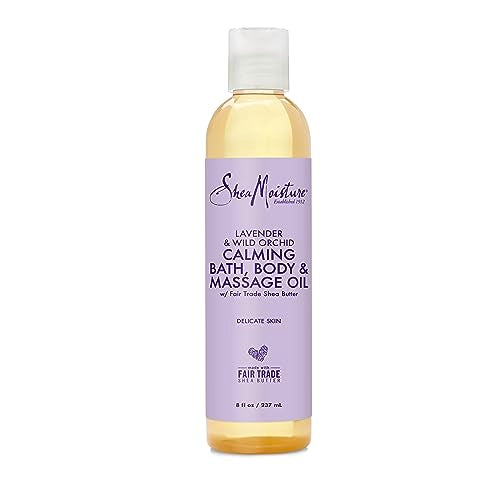
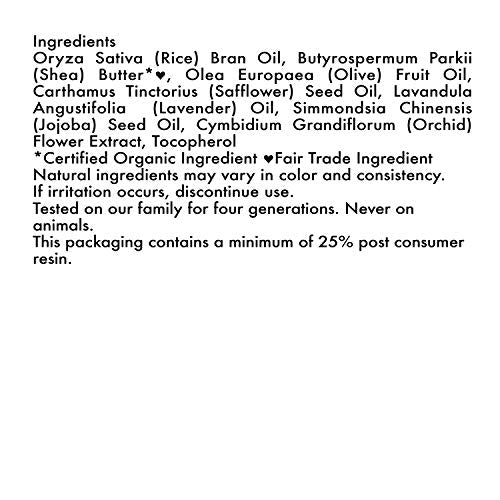
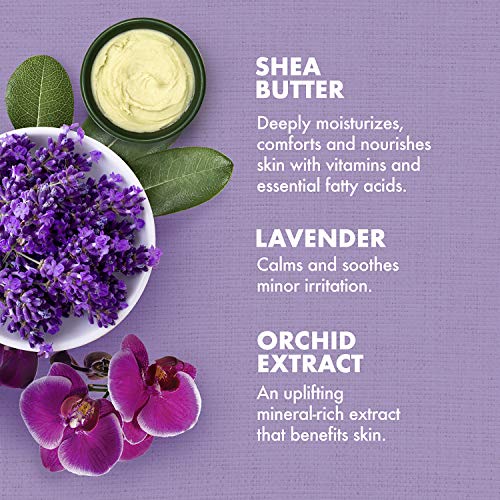
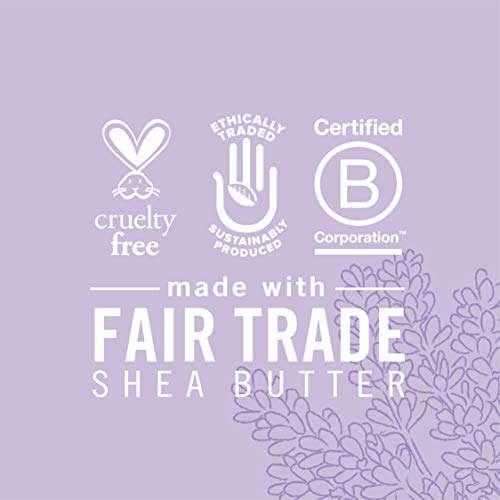
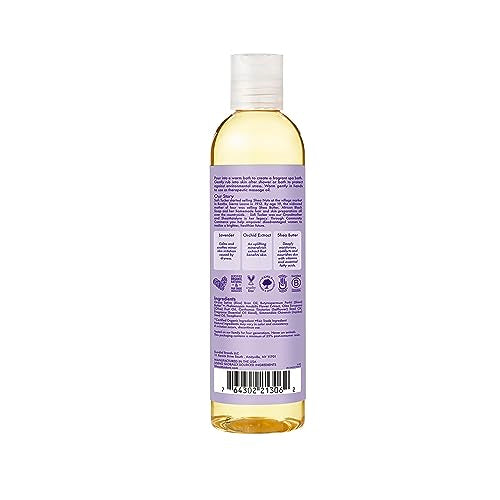
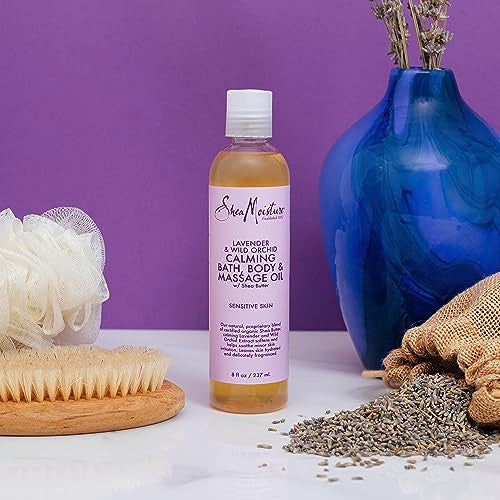
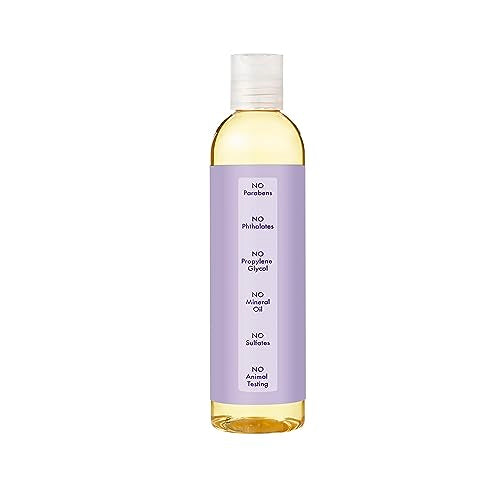
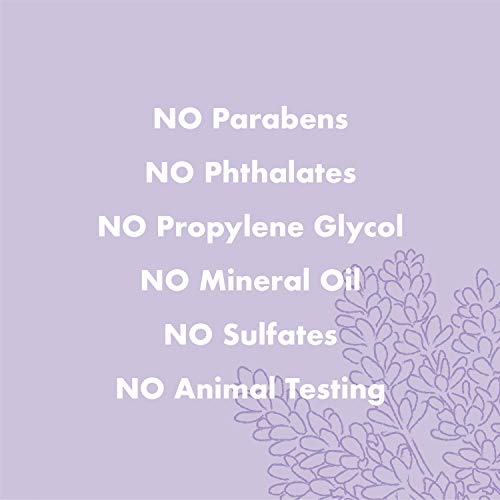
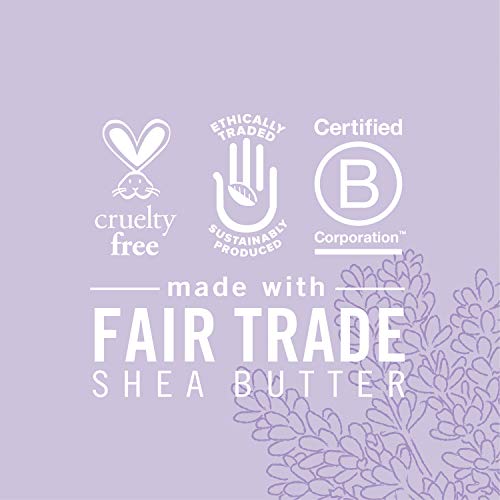
SheaMoisture Body Oil - Lavender Calming Moisturizer for Sensitive Skin, Fair Trade - 8oz


Olea Europaea (Olive) Oil
Low RiskOlea europaea (olive) oil is derived from the ripe fruit of the olive tree. It is commonly used in cosmetic formulations primarily as a moisturizer and emollient due to its nourishing properties for the skin. It also serves as a carrier oil for other ingredients in formulations.
Sustai Insights
Olea europaea (olive) oil offers numerous functional benefits, including effective moisturization and enhanced skin absorption properties, making it suitable for various cosmetic applications. It is a biodegradable ingredient, contributing to sustainability when sourced responsibly. Health risks are low, with minimal concerns regarding carcinogenicity, allergenic potential, and developmental toxicity. Environmental risks are also low, with no significant bioaccumulation or pollution potential noted. Regulatory bodies do not impose restrictions on its use. Overall, olive oil presents a low risk profile, making it a favorable choice in cosmetic products.
Carthamus Tinctorius (Safflower) Seed Oil
Low RiskCarthamus tinctorius (safflower) seed oil is derived from the seeds of the safflower plant. It is primarily used in cosmetic formulations for its emollient properties, helping to moisturize and soften the skin. The oil is rich in unsaturated fatty acids and is often employed in skin care products for its potential benefits to skin health.
Sustai Insights
Safflower seed oil offers functional benefits as a moisturizer and emollient, contributing to skin hydration without significant irritation. It is generally recognized as low risk concerning health impacts, with minimal concerns over carcinogenicity, allergies, and reproductive toxicity. Environmentally, it poses low risks, being non-bioaccumulative and not a significant pollutant. Regulatory bodies do not impose restrictions on its use, underscoring its safety profile. While there are no widely recognized safer alternatives, users should ensure proper application to mitigate any potential skin irritation. Overall, this ingredient is assessed as low risk.
Simmondsia Chinensis (Jojoba)
Low RiskSimmondsia chinensis, commonly known as jojoba, is an oil derived from the seeds of the jojoba plant. It is commonly used in cosmetic formulations for its moisturizing properties, acting as an emollient and skin conditioning agent.
Sustai Insights
Jojoba oil offers functional benefits such as effective skin moisturization and is biodegradable, with sustainable sourcing practices. Health risks are low, with minimal concerns regarding carcinogenicity, allergies, and reproductive toxicity. Environmental impact is negligible, with no pollutant or bioaccumulation potential. Regulatory status is favorable with no significant restrictions noted. Overall, it is assessed as low risk, and safe usage practices should be maintained. Alternatives include other plant-derived oils like argan or almond oil, which may provide similar benefits.
Cybidium Grandiflorum (Orchid) Flower Extract
Low RiskCymbidium grandiflorum (orchid) flower extract is derived from the flowers of the Cymbidium orchid. It is commonly used in cosmetic formulations for its potential soothing and moisturizing properties, contributing to the overall sensory experience of products.
Sustai Insights
Cymbidium grandiflorum flower extract offers functional benefits, including skin soothing and moisturizing properties, and is often sustainably sourced. Health risks are low, with minimal concerns regarding carcinogenicity, allergenic potential, and reproductive toxicity. Environmental risks are also low, as it does not contribute significantly to pollution or bioaccumulation. Regulatory bodies do not impose restrictions on its use, indicating a low overall risk level. Safe usage practices are recommended, and alternatives are available, although they may not provide the same sensory benefits. Overall, this ingredient is considered low risk.
Tocopherol, D Alpha
Low RiskTocopherol, specifically d-alpha tocopherol, is a naturally occurring form of Vitamin E. It is commonly used in cosmetic and personal care products primarily for its antioxidant properties, helping to protect formulations from oxidation and extend shelf life.
Sustai Insights
D-alpha tocopherol provides effective antioxidant benefits, contributing to product stability. It is sustainably sourced and generally regarded as safe, with low concerns regarding carcinogenicity, allergies, and reproductive toxicity. However, there are minor concerns about endocrine disruption. Regulatory bodies have not imposed significant restrictions, indicating low overall risk. Recommended usage practices include adhering to established safe concentration thresholds. Alternatives, such as other forms of Vitamin E or plant-based antioxidants, may also be considered.
Oryza Sativa (Rice) Oil
Low RiskOryza sativa (rice) oil is a refined oil derived from the grains of the rice plant. It is commonly used in cosmetic and personal care products for its emollient properties, helping to moisturize and soften the skin. Additionally, rice oil can serve as a carrier oil for other ingredients.
Sustai Insights
Oryza sativa (rice) oil offers functional benefits as a moisturizer and emollient, contributing to skin softness. It is considered low risk regarding carcinogenicity, allergies, and reproductive toxicity, with contamination concerns being a notable issue. Environmentally, it poses minimal pollution risk and is not bioaccumulative. Regulatory bodies do not impose significant restrictions on its use. Overall, rice oil is assessed as low risk, making it a suitable ingredient in personal care formulations. Safe usage practices include ensuring proper sourcing to mitigate contamination risks, and alternatives like jojoba or almond oil may be considered for similar benefits.
Butyrospermum Parkii (Shea) Butter
Low RiskButyrospermum parkii (shea) butter is a vegetable fat derived from the nuts of the shea tree. It is commonly used in cosmetic formulations for its emollient properties, providing moisture and improving skin texture. Additionally, shea butter is known for its ability to enhance the stability of products and deliver a creamy texture.
Sustai Insights
Shea butter offers functional benefits as an effective moisturizer, enhancing skin barrier function and texture. It is sustainably sourced and biodegradable, contributing to eco-friendliness. Health-wise, it is associated with low risks for carcinogenicity, allergies, and reproductive toxicity. Environmental impacts are minimal, with no significant pollutant potential identified. Regulatory assessments indicate no current restrictions. Overall, the ingredient presents a low risk, making it a favorable choice in cosmetic formulations.
Olea Europaea (Olive) Oil
Low RiskOlea europaea (olive) oil is derived from the ripe fruit of the olive tree. It is commonly used in cosmetic formulations primarily as a moisturizer and emollient due to its nourishing properties for the skin. It also serves as a carrier oil for other ingredients in formulations.
Sustai Insights
Olea europaea (olive) oil offers numerous functional benefits, including effective moisturization and enhanced skin absorption properties, making it suitable for various cosmetic applications. It is a biodegradable ingredient, contributing to sustainability when sourced responsibly. Health risks are low, with minimal concerns regarding carcinogenicity, allergenic potential, and developmental toxicity. Environmental risks are also low, with no significant bioaccumulation or pollution potential noted. Regulatory bodies do not impose restrictions on its use. Overall, olive oil presents a low risk profile, making it a favorable choice in cosmetic products.
Carthamus Tinctorius (Safflower) Seed Oil
Low RiskCarthamus tinctorius (safflower) seed oil is derived from the seeds of the safflower plant. It is primarily used in cosmetic formulations for its emollient properties, helping to moisturize and soften the skin. The oil is rich in unsaturated fatty acids and is often employed in skin care products for its potential benefits to skin health.
Sustai Insights
Safflower seed oil offers functional benefits as a moisturizer and emollient, contributing to skin hydration without significant irritation. It is generally recognized as low risk concerning health impacts, with minimal concerns over carcinogenicity, allergies, and reproductive toxicity. Environmentally, it poses low risks, being non-bioaccumulative and not a significant pollutant. Regulatory bodies do not impose restrictions on its use, underscoring its safety profile. While there are no widely recognized safer alternatives, users should ensure proper application to mitigate any potential skin irritation. Overall, this ingredient is assessed as low risk.
Simmondsia Chinensis (Jojoba)
Low RiskSimmondsia chinensis, commonly known as jojoba, is an oil derived from the seeds of the jojoba plant. It is commonly used in cosmetic formulations for its moisturizing properties, acting as an emollient and skin conditioning agent.
Sustai Insights
Jojoba oil offers functional benefits such as effective skin moisturization and is biodegradable, with sustainable sourcing practices. Health risks are low, with minimal concerns regarding carcinogenicity, allergies, and reproductive toxicity. Environmental impact is negligible, with no pollutant or bioaccumulation potential. Regulatory status is favorable with no significant restrictions noted. Overall, it is assessed as low risk, and safe usage practices should be maintained. Alternatives include other plant-derived oils like argan or almond oil, which may provide similar benefits.
Cybidium Grandiflorum (Orchid) Flower Extract
Low RiskCymbidium grandiflorum (orchid) flower extract is derived from the flowers of the Cymbidium orchid. It is commonly used in cosmetic formulations for its potential soothing and moisturizing properties, contributing to the overall sensory experience of products.
Sustai Insights
Cymbidium grandiflorum flower extract offers functional benefits, including skin soothing and moisturizing properties, and is often sustainably sourced. Health risks are low, with minimal concerns regarding carcinogenicity, allergenic potential, and reproductive toxicity. Environmental risks are also low, as it does not contribute significantly to pollution or bioaccumulation. Regulatory bodies do not impose restrictions on its use, indicating a low overall risk level. Safe usage practices are recommended, and alternatives are available, although they may not provide the same sensory benefits. Overall, this ingredient is considered low risk.
Tocopherol, D Alpha
Low RiskTocopherol, specifically d-alpha tocopherol, is a naturally occurring form of Vitamin E. It is commonly used in cosmetic and personal care products primarily for its antioxidant properties, helping to protect formulations from oxidation and extend shelf life.
Sustai Insights
D-alpha tocopherol provides effective antioxidant benefits, contributing to product stability. It is sustainably sourced and generally regarded as safe, with low concerns regarding carcinogenicity, allergies, and reproductive toxicity. However, there are minor concerns about endocrine disruption. Regulatory bodies have not imposed significant restrictions, indicating low overall risk. Recommended usage practices include adhering to established safe concentration thresholds. Alternatives, such as other forms of Vitamin E or plant-based antioxidants, may also be considered.
Oryza Sativa (Rice) Oil
Low RiskOryza sativa (rice) oil is a refined oil derived from the grains of the rice plant. It is commonly used in cosmetic and personal care products for its emollient properties, helping to moisturize and soften the skin. Additionally, rice oil can serve as a carrier oil for other ingredients.
Sustai Insights
Oryza sativa (rice) oil offers functional benefits as a moisturizer and emollient, contributing to skin softness. It is considered low risk regarding carcinogenicity, allergies, and reproductive toxicity, with contamination concerns being a notable issue. Environmentally, it poses minimal pollution risk and is not bioaccumulative. Regulatory bodies do not impose significant restrictions on its use. Overall, rice oil is assessed as low risk, making it a suitable ingredient in personal care formulations. Safe usage practices include ensuring proper sourcing to mitigate contamination risks, and alternatives like jojoba or almond oil may be considered for similar benefits.
Butyrospermum Parkii (Shea) Butter
Low RiskButyrospermum parkii (shea) butter is a vegetable fat derived from the nuts of the shea tree. It is commonly used in cosmetic formulations for its emollient properties, providing moisture and improving skin texture. Additionally, shea butter is known for its ability to enhance the stability of products and deliver a creamy texture.
Sustai Insights
Shea butter offers functional benefits as an effective moisturizer, enhancing skin barrier function and texture. It is sustainably sourced and biodegradable, contributing to eco-friendliness. Health-wise, it is associated with low risks for carcinogenicity, allergies, and reproductive toxicity. Environmental impacts are minimal, with no significant pollutant potential identified. Regulatory assessments indicate no current restrictions. Overall, the ingredient presents a low risk, making it a favorable choice in cosmetic formulations.
Discover the soothing touch of SheaMoisture's Lavender Wild Orchid Calming Moisturizer, a luxurious body oil designed specifically for sensitive skin. Infused with Wild Orchid Extract and calming lavender, this moisturizer hydrates while enveloping you in a gentle fragrance. Perfect for daily use or as a relaxing massage oil, it offers a blend of skin-nourishing ingredients that you can feel good about.
- Moisturizing Benefit: Infused with Wild Orchid Extract, this body oil deeply hydrates sensitive skin, leaving it soft and lightly scented.
- Relaxation Use Case: Ideal for post-shower or bath, this lavender body oil helps relax both the mind and body, enhancing your self-care routine.
- Safe Ingredients: Free from parabens, phthalates, mineral oils, and sulfates, ensuring a gentle application for delicate skin.
- Ethical Sourcing: Made with Fair Trade Certified Organic Shea Butter and nourishing oils, supporting sustainable practices.
- Cruelty-Free Assurance: Tested on family for generations, this product is cruelty-free and reflects a commitment to ethical beauty.
Subscribe & Save with Sustai
- Best Price Guarantee: Always enjoy the lowest prices on sustainable home essentials.
- No Surprises: We’ll notify you before shipping. No hidden fees, ever.
- You’re in Charge: Change, pause, or cancel your subscription anytime with ease.
- Eco-Friendly Deliveries: Our grouped shipments mean less packaging and lower emissions.
Join us on a sustainable journey. Special offers for a limited time! Prices and promotions may change.
Recommended Products
Discover the soothing touch of SheaMoisture's Lavender Wild Orchid Calming Moisturizer, a luxurious body oil designed specifically for sensitive skin. Infused with Wild Orchid Extract and calming lavender, this moisturizer hydrates while enveloping you in a gentle fragrance. Perfect for daily use or as a relaxing massage oil, it offers a blend of skin-nourishing ingredients that you can feel good about.
- Moisturizing Benefit: Infused with Wild Orchid Extract, this body oil deeply hydrates sensitive skin, leaving it soft and lightly scented.
- Relaxation Use Case: Ideal for post-shower or bath, this lavender body oil helps relax both the mind and body, enhancing your self-care routine.
- Safe Ingredients: Free from parabens, phthalates, mineral oils, and sulfates, ensuring a gentle application for delicate skin.
- Ethical Sourcing: Made with Fair Trade Certified Organic Shea Butter and nourishing oils, supporting sustainable practices.
- Cruelty-Free Assurance: Tested on family for generations, this product is cruelty-free and reflects a commitment to ethical beauty.

You can have at most 2 Sustainable Steals products in your cart
Customer Reviews
Customers’ View
Customers express strong appreciation for SheaMoisture's Lavender Body Oil, particularly highlighting its effectiveness in providing deep hydration without a greasy feel. Users frequently mention the soothing lavender scent, which enhances relaxation, making it an ideal choice for post-shower application or massages. Many reviews emphasize that it is gentle on sensitive skin, with several users noting its ability to alleviate redness and bumps. Additionally, customers value the product's clean ingredients, free from parabens and sulfates, and its cruelty-free certification, aligning perfectly with eco-conscious and health-focused values. Overall, this body oil is seen as a luxurious yet practical addition to personal care routines.
AI-generated from the text of customer reviewsThis product is rated 4.6 of 5.0 stars.
It has received 25 reviews.





